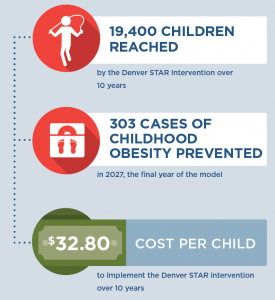The information in this brief is intended only to provide educational information.
This brief summarizes findings from a CHOICES Learning Collaborative Partnership model of implementation of the “Study of Technology to Accelerate Research” (STAR) intervention in Denver Health pediatric primary care settings. Denver STAR leverages electronic health record (EHR) decision support tools to facilitate the diagnosis and management of childhood obesity during well-child care visits.
The Issue
Over the past four decades, childhood obesity has tripled.1 Health care costs for treating obesity-related health conditions are high, costing $147 billion in 2008.2 Interventions in clinical settings that aim to manage childhood obesity have the potential to help children lead healthier lives, reduce obesity prevalence in adulthood, and reduce health care costs.3
In Denver, 13.9% of 2-12 years old seen at Denver Health clinics have obesity. Although time-intensive counseling to improve dietary intake and physical activity is recommended, these interventions are often time consuming, resource intensive, and difficult to implement and sustain.3,4 Leveraging existing EHRs to facilitate childhood obesity diagnosis and management, and engaging families through direct-to-parent communications, is a promising clinical strategy to reduce the prevalence of childhood obesity at a relatively low cost.
About STAR
The Denver STAR intervention leverages EHR decision support tools, operated by EPIC software, to promote recognition of pediatric obesity and facilitate recommended screening and management during pediatric well-child care visits. In addition, the Denver STAR intervention includes direct-to-parent communications in which parents receive text messages to support behavior change for their children. Families would also have access to a webpage that shares local health and wellness resources. Primary Care Physicians (PCPS) who see pediatric patients at Denver Health clinics would be trained in the EHR changes and motivational interviewing techniques to facilitate weight management discussions with the patients and families. Evidence obtained in a cluster randomized controlled trial showed that STAR helped to prevent excess weight gain compared to usual care.4
Comparing Costs and Outcomes
CHOICES cost-effectiveness analysis compared the costs and outcomes of the implementation of STAR within pediatric primary care practices in Denver Health with the costs and outcomes associated with not implementing STAR over a 10 year time period (2017-2027). The approach assumes that all Denver Health pediatric primary care clinics would implement STAR. We assume that all children ages 2- 12 with obesity (BMI > 95th percentile) who visit Denver Health clinics for well-child visits would benefit from the intervention.
Implementing STAR in Denver Health pediatric primary care settings is an investment in the future. By the end of 2027: |
Conclusions and Implications
Every child deserves a healthy start in life. This includes developing innovative clinical strategies that can be feasibly implemented to improve the quality of care for childhood obesity in pediatric primary care settings. By leveraging EHR tools managed by EPIC, Denver STAR is a scalable intervention that can be feasibly implemented in all Denver Health primary care clinics. The intervention is expected to reach 19,400 children over 10 years and would prevent 303 cases of childhood obesity in the final year of the model.
Denver STAR is a good buy as it is likely to have a high magnitude of effect on improving children’s health at a relatively low cost per child. For every $1 spent on implementing Denver STAR, a projected $0.78 would be saved in obesity-related health care costs. Denver STAR also supports institutional policies by collecting reportable data for Healthcare Effectiveness Data and Information Set (HEDIS) performance measures.
Denver STAR intervention is projected to both improve overall population health, as well as reduce disparities in childhood obesity. The modeled implementation of STAR in Denver Health, a health system that predominantly serves a higher proportion of racial/ethnic minority groups, is projected to result in significant health benefits among Hispanic and Black populations in Denver.
Evidence is growing about how to help children achieve a healthy weight. Interventions such as Denver STAR, which is evidence-based, feasible to implement, and relatively low cost, can improve the quality of care of childhood obesity in pediatric primary care.
References
- Fryar CD, Carroll MD, Ogden CL, Prevalence of overweight and obesity among children and adolescents: United States, 1963-1965 through 2011-2012. Atlanta, GA: National Center for Health Statistics, 2014.
- Finkelstein EA, Trogdon JG, Cohen JW, Dietz W. Annual Medical Spending Attributable To Obesity: Payer-And Service-Specific Estimates. Health Affairs. 2009;28(5).
- Sharifi, M., Franz, C., Horan, C. M., Giles, C. M., Long, M. W., Ward, Z. J., … & Taveras, E. M. Cost-Effectiveness of a Clinical Childhood Obesity Intervention. Pediatrics. 2017, e20162998.
- Taveras E., Marshall R., Kleinman KP, Gillman MW, Hacker K….Simon SR. (2015). Comparative Effectiveness of Childhood Obesity Interventions in Pediatric Primary Care: A Cluster-Randomized Clinical Trial, JAMA Pediatrics, 169(6):535-542
Suggested Citation:Moreland J, Rosen J, Kraus E, Reiner J, Gortmaker S, Giles C, Ward Z. Denver: Study of Technology to Accelerate Research (STAR) {Issue Brief}. Denver Public Health and Denver Health, Denver, CO, and the CHOICES Learning Collaborative Partnership at the Harvard T.H. Chan School of Public Health, Boston, MA; July 2018. For more information, please visit www.choicesproject.org The design for this brief and its graphics were developed by Molly Garrone, MA and partners at Burness. This issue brief was developed at the Harvard T.H. Chan School of Public Health in collaboration with Denver Public Health and Denver Health through participation in the Childhood Obesity Intervention Cost-Effectiveness Study (CHOICES) Learning Collaborative Partnership. This brief is intended for educational use only. This work is supported by The JPB Foundation. The findings and conclusions are those of the author(s) and do not necessarily represent the official position of the funder. |
